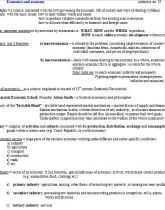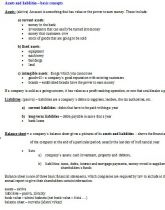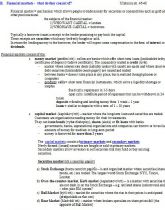Hledej
Zobraz:
Univerzity
Kategorie
Rozšířené vyhledávání
12 663
projektů
Angličtina - otázky k závěrečné zkoušce
| Přípona .doc |
Typ vypracované otázky |
Stažené 0 x |
| Velikost 0,4 MB |
Jazyk český |
ID projektu 4361 |
| Poslední úprava 20.10.2014 |
Zobrazeno 1 670 x |
Autor: kralova.lucie |
 Sdílej na Facebooku
Sdílej na Facebooku |
||
| Detaily projektu | ||
- Cena:
6 Kreditů - kvalita:
82,9% -
Stáhni
- Přidej na srovnání
- Univerzita:Vysoká škola finanční a správní
- Fakulta:Fakulta ekonomických studií
- Kategorie:Jazyky » Angličtina
- Předmět:Angličtina
- Studijní obor:-
- Ročník:-
- Formát:MS Office Word (.doc)
- Rozsah A4:51 stran
1.A. Economics and economy
Economics = a science concerned with the laws governing the economic life of society and ways of dealing (vyřešení problémů) with the main issues: how to meet human wants and needs
how to produce valuable commodities from the existing scarce resources
how to allocate them efficiently to domestic and foreign users
the most important question to by answered by economists is : WHAT, HOW and for WHOM to produce,
HOW to reach stable economic development without crises
economics has 2 branches: a) microeconomics - is related to the problems concerning single elements of country´s
economy (business firms, households, markets, behaviour of
individual consumers, and prices of single products)
b) macroeconomics - deals with issues relating to the economy as a whole, examines and
explains economic facts in aggregate / in totals for the whole
country
Main tasks are: to reach economic stability and prosperity
Fighting negative phenomena (unemployment,
inflation and recession)
Origin of economics - as a science originated at the end of 18th century (Industrial Revolution)
Classical Economic School: Founder: Adam Smith - a Scottish economics and philosopher
Teory of the “Invisible Hand” : invisible hand represented market mechanism - market forces of supply and demand
Market mechanism is able, without directives of any authority, to allocate resources and
production output. People should be left free (laissez-faire) to pursue their own goals.
Under perfect competition they thus contribute to the welfare of the whole community.
Economy = complex of activities and subjects concerned with the production, distribution, exchange and consumption of
goods within a certain area (e.g. Czech Republic, or world economy)
Economic sectors = large parts of the national economy working under different and rather specific conditions:
a) industry
b) agriculture
c) transport
d) construction
e) trade,
f) etc.
Economics = a science concerned with the laws governing the economic life of society and ways of dealing (vyřešení problémů) with the main issues: how to meet human wants and needs
how to produce valuable commodities from the existing scarce resources
how to allocate them efficiently to domestic and foreign users
the most important question to by answered by economists is : WHAT, HOW and for WHOM to produce,
HOW to reach stable economic development without crises
economics has 2 branches: a) microeconomics - is related to the problems concerning single elements of country´s
economy (business firms, households, markets, behaviour of
individual consumers, and prices of single products)
b) macroeconomics - deals with issues relating to the economy as a whole, examines and
explains economic facts in aggregate / in totals for the whole
country
Main tasks are: to reach economic stability and prosperity
Fighting negative phenomena (unemployment,
inflation and recession)
Origin of economics - as a science originated at the end of 18th century (Industrial Revolution)
Classical Economic School: Founder: Adam Smith - a Scottish economics and philosopher
Teory of the “Invisible Hand” : invisible hand represented market mechanism - market forces of supply and demand
Market mechanism is able, without directives of any authority, to allocate resources and
production output. People should be left free (laissez-faire) to pursue their own goals.
Under perfect competition they thus contribute to the welfare of the whole community.
Economy = complex of activities and subjects concerned with the production, distribution, exchange and consumption of
goods within a certain area (e.g. Czech Republic, or world economy)
Economic sectors = large parts of the national economy working under different and rather specific conditions:
a) industry
b) agriculture
c) transport
d) construction
e) trade,
f) etc.
Klíčová slova:
economics
fiscal policy
instruments
market
taxes
competition
perfect and imperfect competition
Obsah:
- 1.A. Economics and economy
1.B. Fiscal policy & its instruments
2. A. Economic systems
2.B. Classification of taxes
3.A. Market- market functions, areas, types of markets
3.B. Direct and indirect taxes
4.A. Market agents, market elements
4.B. Taxes in the CR
5.A. Competition, the impact of competition
5.B. Tax administration
6.A. Perfect and imperfect competition
6.B. Tax avoidance, tax evasion
7.A. What is money? The functions of money
7.B. Starting a business - Founding a company
8.A. Evolution of money
8.B. Company organisation, various types of companies
9.A. Interest - types of interest rates, Exchange rates, money supply - hot, tight, cheap money
9.B. Management, human resources, ethical standards
10.A. Inflation - how can it be characterised? Measuring inflation, types of inflation
10.B. Partnership - general and limited
11.A. Unemployment - measuring unemployment, types
11.B. How are firms registered in the UK?
12.A. Gross National Product, Gross Domestic Product, construction of GNP, Underground economy
12.B. SME´s - their role in the economy
13.A. Factors of production
13.B. Assets and liabilities - basic concepts
14.A. Economic growth, Sustainable economic growth, how to achieve economic growth
14.B. Accounting principles, depreciation, cash flow, financial statements
15.A. International and domestic trade
15.B. Balance sheet, Profit and lost account
16.A. Characteristic features of international trade in the post-war period
16.B. Auditing, The Auditor´s Report
17.A. Balance of payments - visibles, invisibles
17.B. The annual report - annual general meetings
18.A. Protectionism, trade policy and its instruments, Customs duties
18.B. Pricing, Pricing strategies
19.A. Major international organisations (UN and its bodies, WTO, OECD, NATO…)
19. B. Marketing strategies, Market forecasting
20. A. Important integrations & the EU - how did it come into existence, the EMU, Euro, Integration efforts of the CR
20. B. Financial markets - what do they consist of?


